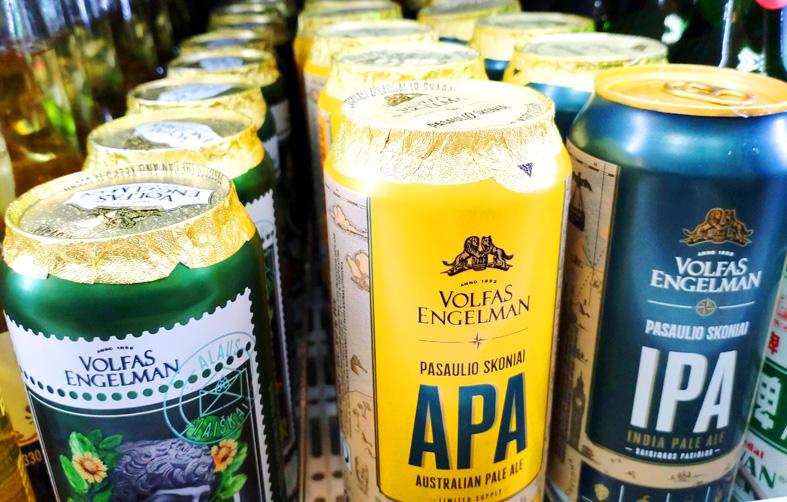A senior agriculture official in Lithuania has asked Taipei to speed up import permissions for agricultural products from the Baltic nation, as it could benefit from accessing the Taiwanese market amid economic sanctions from China.
Antanas Venckus, head of the Lithuanian Ministry of Agriculture’s International Affairs and Export Promotion Department, made the comments in an interview with the Central News Agency.
Taiwan is a potential market for Lithuania’s agricultural and food products, Venckus said.

Photo: Yang Cheng-yu, Taipei Times
As sanctions from Beijing are preventing a large number of Lithuanian companies from entering the Chinese market, Taiwanese authorities are doing their best to help the companies to redirect their agricultural shipments to Taiwan, he said.
“That’s a good move — and, of course, we appreciate that very much,” he said.
However, many of the companies are still waiting for permissions and licenses from Taiwan, Venckus added.
“We call for urgent action from the Taiwanese side to help us to make these exports eligible,” he said. “Now the ball is on the Taiwanese side and we are waiting for these actions to make these exports possible.”
Lithuania has faced increased political and economic pressure from China after it last month allowed Taiwan to open a representative office in the nation’s capital, Vilnius, with “Taiwanese” in the office’s official name.
The official names of Taiwan’s representative offices in other European countries typically use “Taipei” instead of “Taiwan” or “Taiwanese.”
China’s retaliatory actions have included recalling its ambassador to Lithuania and expelling Lithuania’s ambassador to China, as well as suspending direct freight train services to the Baltic nation and banning Lithuanian products from entering the Chinese market.
Lithuanian firms are worried about the sanctions, Venckus said.
“The biggest problem is that Lithuania disappeared from the customs system [of China] as a country of origin,” he said.
Although the Chinese said that it was a “technical problem,” everyone knows that Beijing is deliberately banning Lithuanian imports, Venckus added.
To make things worse for Lithuania, Chinese authorities are pressuring international companies to stop working with their Lithuanian counterparts.
“They are saying, if you are going to continue to cooperate with Lithuanian companies and buy components from them, we will not buy your goods — and this is a huge problem,” he said.
It was not Lithuania’s intention to negatively impact its relations with China, he said.
“Normally, we do not mix politics with the economy, but we understand that in authoritarian countries, everything is mixed together and it’s a pity that businesspeople are paying quite a high price,” he added.
No one is blaming the government, as far as he knows, as businesspeople knew that these problems would surface sooner or later, Venckus said.
“This is also a message for all the other countries in the European Union. [This is] what’s going to happen or what might happen, you know, if you are not playing according to the rules of the Chinese government, and if you defend your interests, which are based on your values,” he said.
Fortunately, other EU countries, the US and Taiwan are supporting Lithuania, he added.
Lithuania plans to send a business delegation to Taiwan headed by its agriculture minister sometime next year to enhance trade relations, he said.

The brilliant blue waters, thick foliage and bucolic atmosphere on this seemingly idyllic archipelago deep in the Pacific Ocean belie the key role it now plays in a titanic geopolitical struggle. Palau is again on the front line as China, and the US and its allies prepare their forces in an intensifying contest for control over the Asia-Pacific region. The democratic nation of just 17,000 people hosts US-controlled airstrips and soon-to-be-completed radar installations that the US military describes as “critical” to monitoring vast swathes of water and airspace. It is also a key piece of the second island chain, a string of

A magnitude 5.9 earthquake that struck about 33km off the coast of Hualien City was the "main shock" in a series of quakes in the area, with aftershocks expected over the next three days, the Central Weather Administration (CWA) said yesterday. Prior to the magnitude 5.9 quake shaking most of Taiwan at 6:53pm yesterday, six other earthquakes stronger than a magnitude of 4, starting with a magnitude 5.5 quake at 6:09pm, occurred in the area. CWA Seismological Center Director Wu Chien-fu (吳健富) confirmed that the quakes were all part of the same series and that the magnitude 5.5 temblor was

Taiwan will now have four additional national holidays after the Legislative Yuan passed an amendment today, which also made Labor Day a national holiday for all sectors. The Chinese Nationalist Party (KMT) and Taiwan People’s Party (TPP) used their majority in the Legislative Yuan to pass the amendment to the Act on Implementing Memorial Days and State Holidays (紀念日及節日實施辦法), which the parties jointly proposed, in its third and final reading today. The legislature passed the bill to amend the act, which is currently enforced administratively, raising it to the legal level. The new legislation recognizes Confucius’ birthday on Sept. 28, the

The Central Weather Administration has issued a heat alert for southeastern Taiwan, warning of temperatures as high as 36°C today, while alerting some coastal areas of strong winds later in the day. Kaohsiung’s Neimen District (內門) and Pingtung County’s Neipu Township (內埔) are under an orange heat alert, which warns of temperatures as high as 36°C for three consecutive days, the CWA said, citing southwest winds. The heat would also extend to Tainan’s Nansi (楠西) and Yujing (玉井) districts, as well as Pingtung’s Gaoshu (高樹), Yanpu (鹽埔) and Majia (瑪家) townships, it said, forecasting highs of up to 36°C in those areas